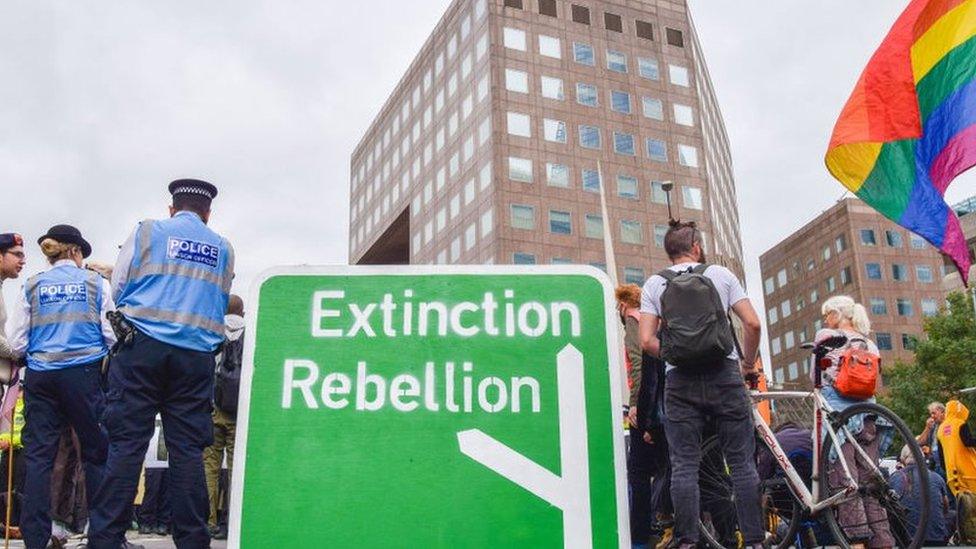Extinction Rebellion: The 'reluctant activists' facing criminal records
- Published
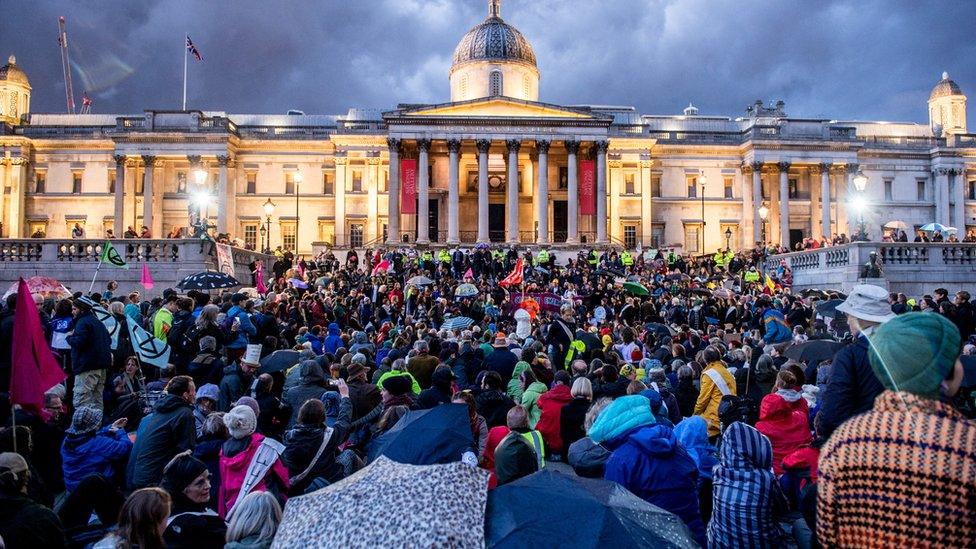
Thousands of people from across the UK have been arrested this year as part of climate change protests that police said have stretched resources.
Extinction Rebellion activists have caused disruption to countless commuters and, in London alone, police estimated their action had cost an extra £37m.
The movement has drawn support from some unexpected corners, so who are the people who have risked their freedom for their beliefs?
The former police officer
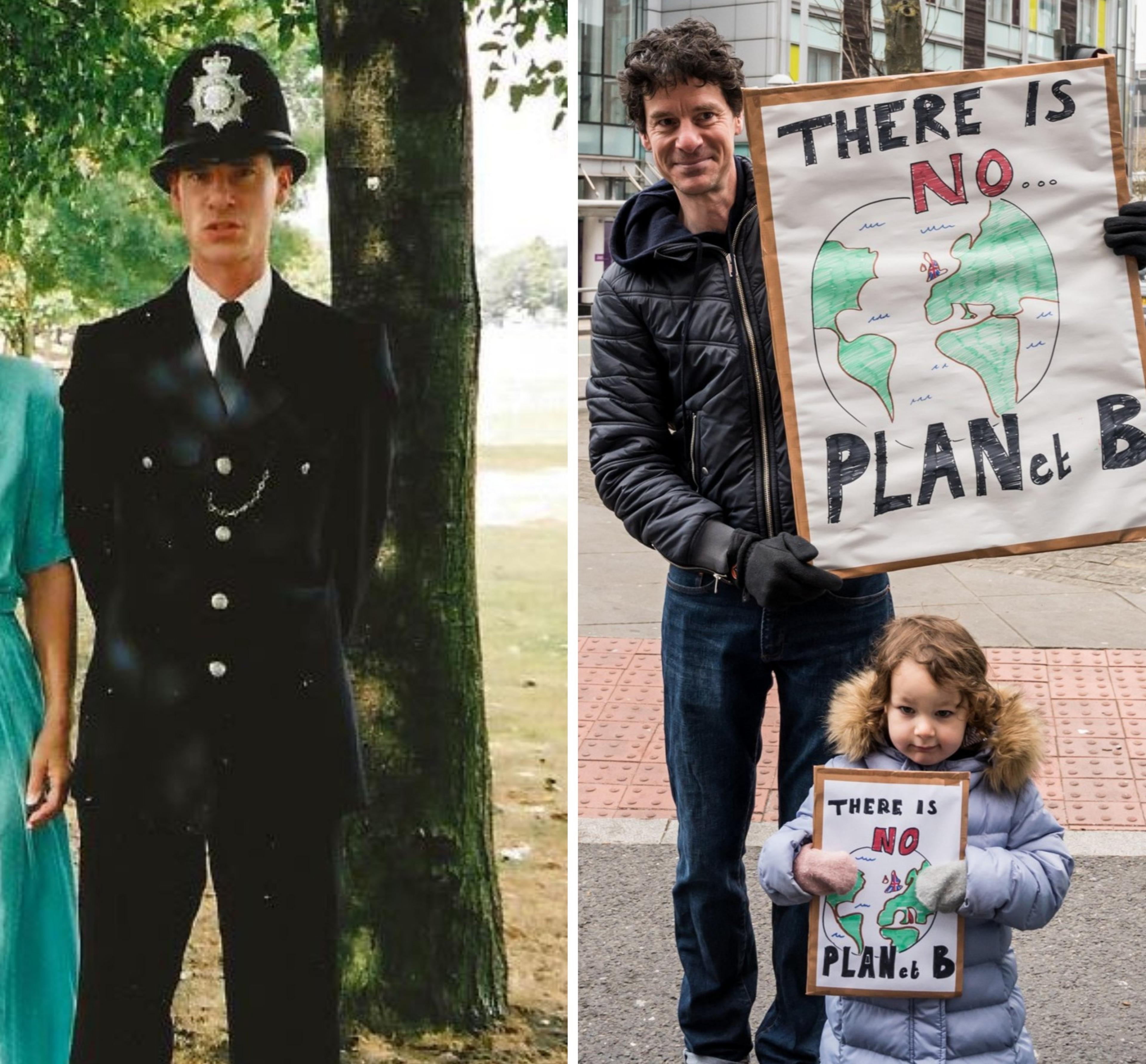
John Curran graduating from Hendon Police College in 2002, left, and protesting in London with his three-and-a-half-year-old daughter, Natasha
"Being interviewed in the police cell was very emotional, I certainly felt like I'd reached the point of no return."
Former police officer John Curran had never envisioned getting arrested.
He left the Metropolitan Police in 2015 to start a family in Nottingham and pursue a career as a guitar maker.
"I had in the back of my head that I'd return to policing because it was a job I enjoyed but, with the arrest, that's it."
Describing himself as a "reluctant activist", he said: "Five years ago if you were to tell me that I'd be arrested and end up in a police cell being interviewed, I would've laughed at you."
The former detective sergeant was first arrested in April, and was most recently detained after gluing himself to the pavement outside London's City Airport in October.
Mr Curran was freed pending further investigation but the arrests have ended any prospect of returning to the police.
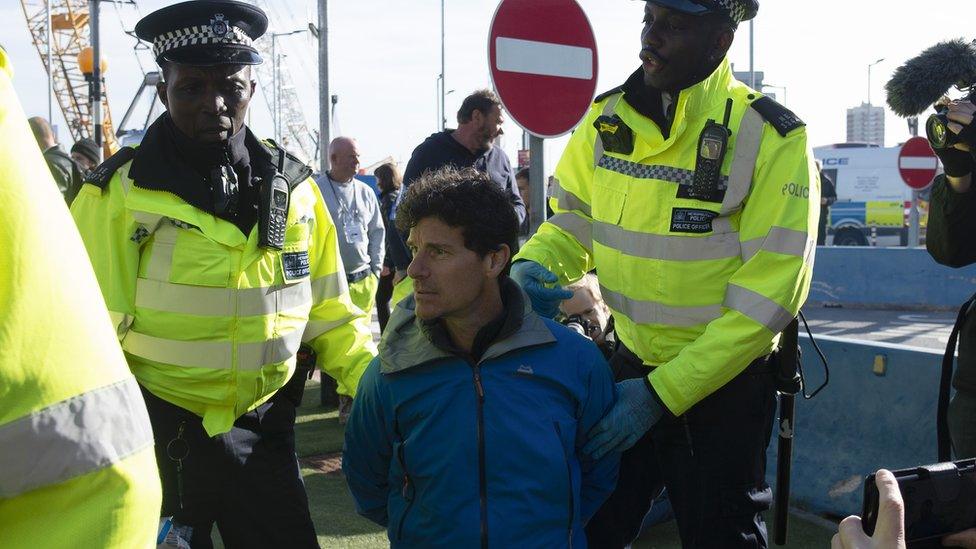
John Curran was most recently arrested in the City Airport protests in October
"The police was such a big part of my life and such a big part of my identity," he said.
"Is it worth it? Ask me in 10 years."
He accepted having to deal with the thousands of protesters "does put a massive strain on police" but said responsibility laid with politicians and their "unwillingness to take action".
The retired librarian

Bristol-based Fi Radford said: "I've never had so much as a parking fine."
Retired academic librarian Fi Radford had "never had so much as a parking fine".
But in April the 71-year-old grandmother from Bristol arrived at the Extinction Rebellion protest in Oxford Circus and said: "I'm prepared to get arrested.
"Then I heard a deep voice behind me saying 'I think I could arrange that for you madam'."
The police officer told Ms Radford she was contravening Section 14 of the Public Order Act and would have to move on.
She instead sat in the road and was carried by four police officers and, after pleading guilty, she was fined £70 and given a conditional discharge.
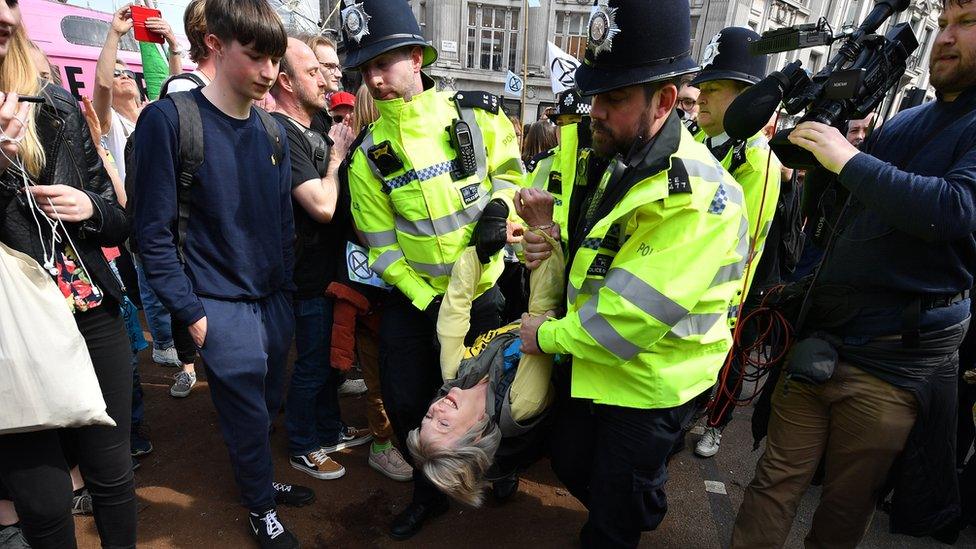
Fi Radford was one of 1,148 people to get arrested in Extinction Rebellion's April protests
"I was with some friends last night who said 'You must be the coolest granny ever, you have a burner phone'," she said.
Ms Radford said Extinction Rebellion activists used "burner phones" - mobiles they use temporarily instead of their normal phones - so police could not access their personal phones.
But the group's protests have been heavily criticised for disrupting the lives of tens of thousands of people, most notably when protesters halted trains at Canning Town at the height of rush hour last month.
One eyewitness captured the moment a climate protester was dragged from top of Tube train
Ms Radford said:"I was deeply unhappy about it, and I do think Extinction Rebellion is going to give this whole issue a lot of thought."
She said she believed the group should target government departments and conglomerates, which she said "invest in every ecocidal thing going."
The former firefighter
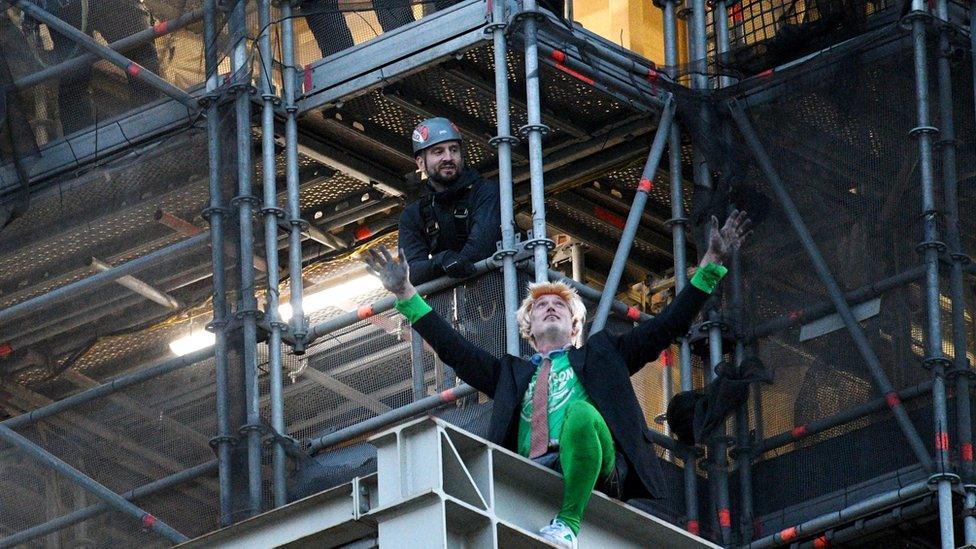
Ben Atkinson scaled scaffolding around Parliament's Elizabeth Tower three hours after appearing in court for an earlier arrest
"This is the side of Extinction Rebellion people don't want to see," said former firefighter Ben Atkinson.
"They want to see crusties smoking cannabis, blocking the road just for the sake of it. And we're not."
The 43-year-old from Rydal in Cumbria became a firefighter in 2005 and left the service in 2015 after holding several positions.
The father-of-one was arrested in April when he climbed a lamp post.
The charges were dropped in October but three hours after appearing in court he was arrested again climbing up the scaffolding on Parliament's Elizabeth Tower. He was dressed as Boris Johnson in a morph suit.
Like Fi Radford, he disagreed with the group's protests at Canning Town station.
"Symbolically as a protest it was all wrong, it was attacking part of the solution. Public transport is part of the solution."
The doctor
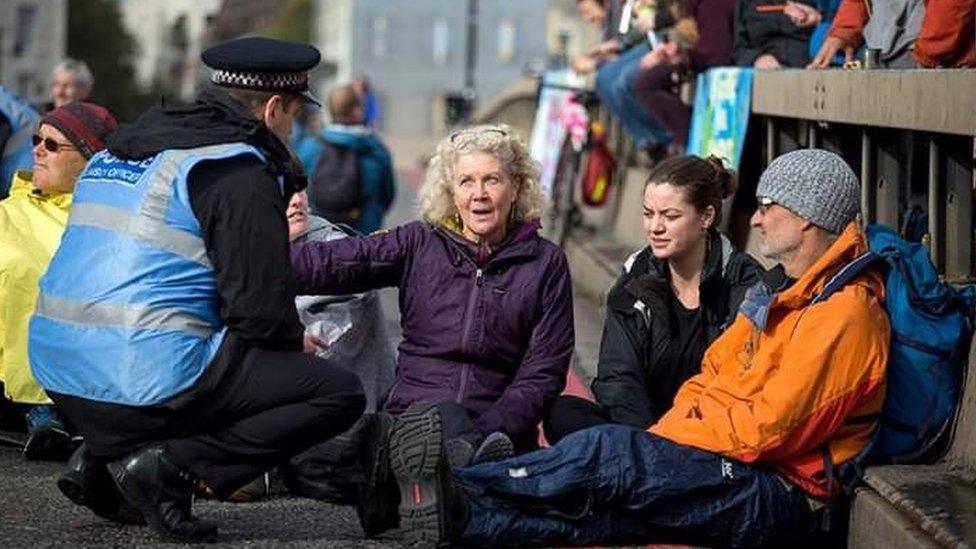
Janet Power has been a doctor for 37 years, and worries her arrests could impact her certificate of good standing
Janet Power is a self-proclaimed "respectable 61-year-old GP".
She has held a certificate of good standing, which stated she had no criminal conviction.
But since April Ms Power has been arrested three times and been found guilty of one count of failing to comply with section 14 of the Public Order Act.
On Wednesday she was fined £320 and given a nine-month conditional discharge for breaching section 14 twice in April.
But most importantly, she now has a criminal record, which she has reported to the General Medical Council.
"It's not a big deal, I'm 61 and if push comes to shove I'm able to stop. But it would be a very hard argument for them [the General Medical Council] to win."
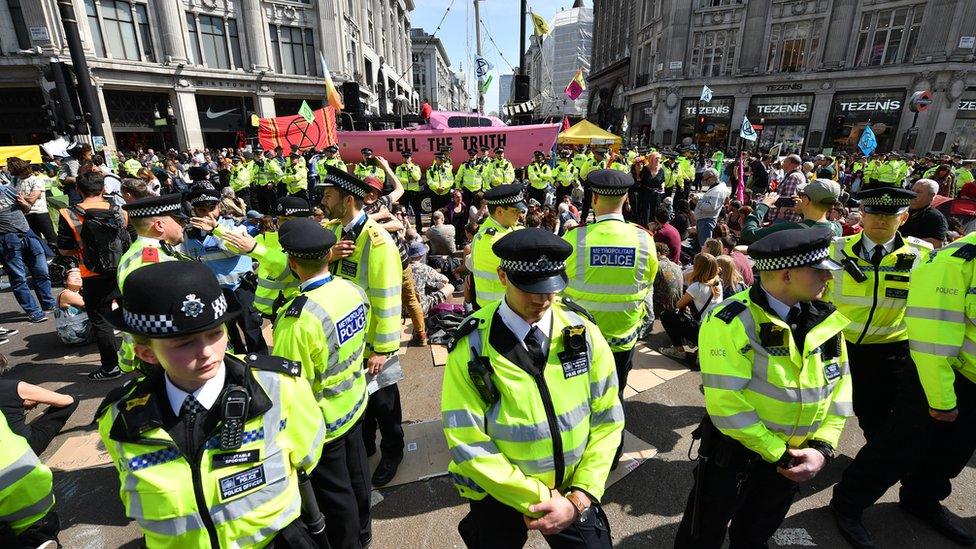
Discussing being arrested, she said: "I bitterly disliked having my fingerprints taken, my DNA taken, and being locked up in a cell for 12 hours.
"I get a bit claustrophobic and I was worried about being locked in a police cell, but it was all right."
She said she believed the disruption to millions of people could be justified by the government's response to the protests in April.
"They declared a climate emergency, it made a difference politically, and that's the reason why I'm willing to inconvenience people."

Follow BBC East Midlands on Facebook, external, Twitter, external, or Instagram, external. Send your story ideas to eastmidsnews@bbc.co.uk
- Published11 October 2019
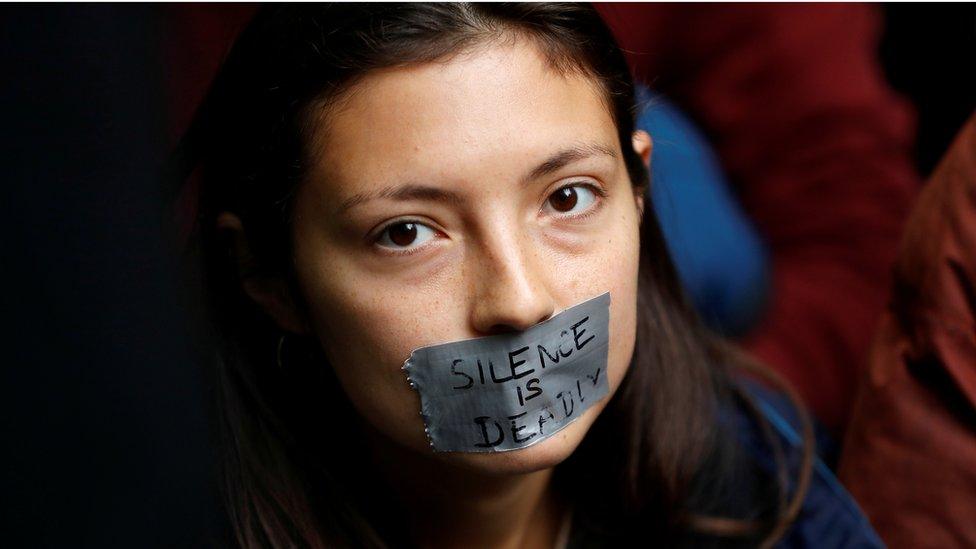
- Published8 October 2019
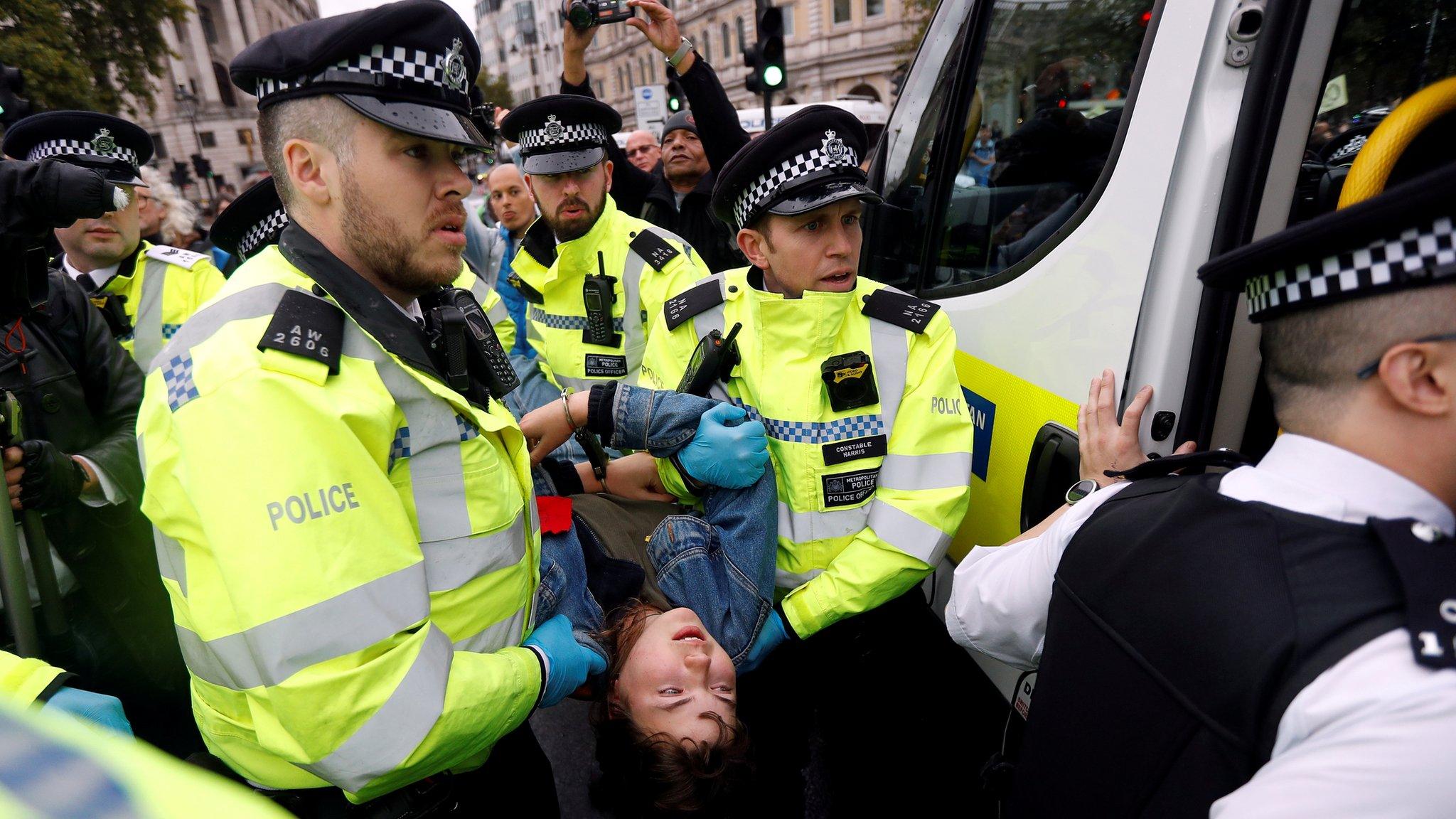
- Published14 April 2022
